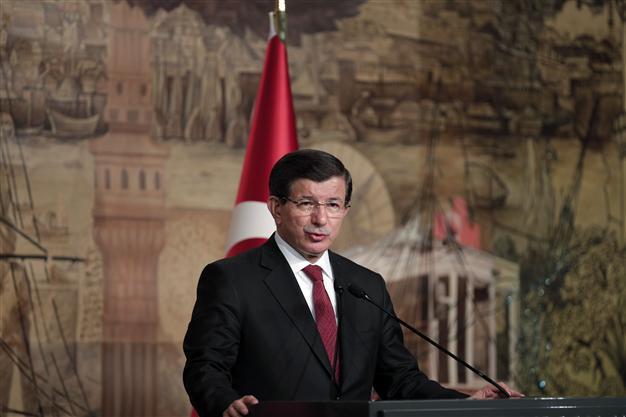Turkey 'not concentration camp', won't host migrants permanently: PM
ISTANBUL / ANKARA

Turkish Prime Minister Ahmet Davutoğlu talks during a joint news conference with Germany's Chancellor Angela Merkel, after their meeting at his office in Dolmabahçe Palace in Istanbul, Sunday, Oct. 18, 2015. AP Photo
Turkey is “not a concentration camp” and will not host migrants permanently to appease the European Union, which wants Turkey to stop the flow of people to Europe, Turkish Prime Minister Ahmet Davutoğlu said Oct. 19, a day after Germany Chancellor Angela Merkel visited Istanbul to discuss refugees.Speaking on a separate occasion, President Recep Tayyip Erdoğan hit hard at claims that Merkel’s visit to Istanbul on Oct. 18 would generate political benefits for the government on the eve of Nov. 1 elections.
“We cannot accept an understanding like ‘give us the money and they stay in Turkey,’” Davutoğlu said in a live television interview a day after talks with Merkel on the migrant crisis.
“I told this to Merkel, too. No one can accept Turkey becoming a country like a concentration camp where all refugees live,” he said.
The talks had, however, resulted in a “positive response” to the government’s request for visa liberalization, he said.
In exchange, Davutoğlu agreed that “illegal immigration should be properly kept under control, so we will set up joint mechanisms” to contain the historic flow of Syrians and others escaping conflict, persecution and poverty who use Turkey as a gateway to Europe.
“We spoke of 3 billion euros [$3.4 billion] as ‘fresh money’ but it is not a fixed sum. Our [financial] needs may increase,” he said.
Merkel on Oct. 18 had hailed as “very promising” progress on an EU-driven “action plan” after talks in Istanbul with Davutoğlu and Erdoğan.
Brussels last week offered Turkey financial help and an acceleration of its drive for EU membership among other sweeteners to persuade it to do more to tighten its border security.
Though Turkey initially poured cold water on the plan, describing it as nothing more than a draft, both Merkel and the Turkish leadership indicated that officials were making progress toward a deal on cooperation.
Davutoğlu insisted the European Union would have to implement its side of the deal before Turkey would play ball.
“In the past, the EU got what it wanted, but didn’t keep its promises. The visa liberalization has to take force,” he said, referring to Turkey’s request for visa-free access for Turks to the EU’s Schengen zone.
“We demanded the abolition of the Schengen visa [for Turks] and got a positive response. It will happen in July 2016; negotiations are continuing. Things will become clear at the start of the 2016,” he said.
His comments came as the migrant crisis intensified in Europe, with thousands of people streaming Oct. 19 into the Balkans, where tighter border controls caused bottlenecks and forced people to sleep in freezing temperatures.
Erdoğan, meanwhile, said while addressing a group of village heads in Ankara on Oct. 19 that those who criticized the timing of Merkel’s visit were devoid of a national identity, using a Central Anatolia inspired word, “mankurt” for the critics.
“The German prime minister is visiting Turkey, and a group, naming themselves academics, are telling her ‘not to come,’ as it would mean support for Erdoğan and Davutoğlu, with a bunch of wrong reasons. I see all those in this attempts as mankurts.”
















